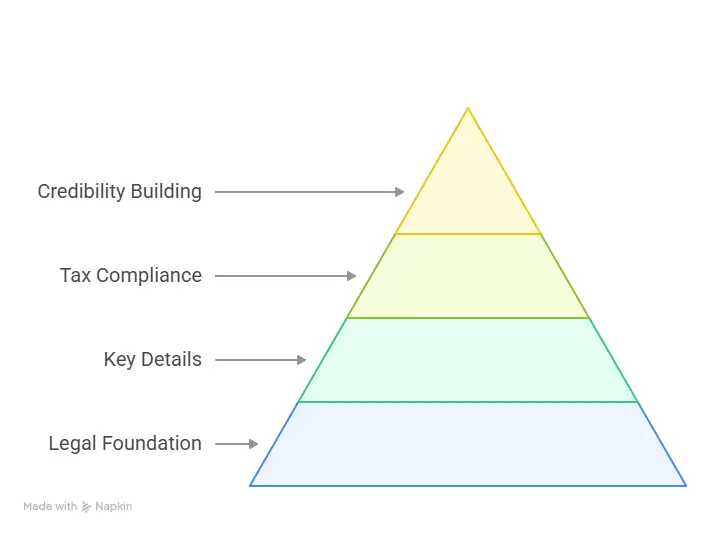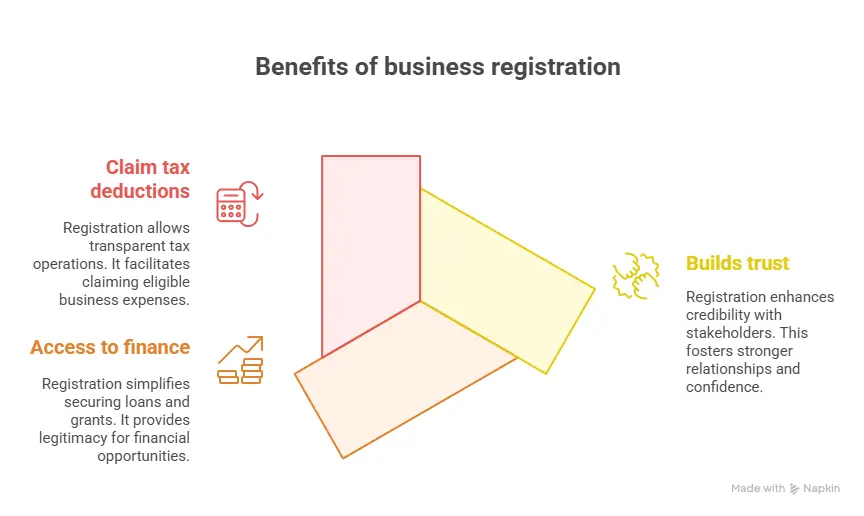To register a business in Australia is a crucial first step for anyone planning to operate legally and professionally. Whether you’re a sole trader, partnership, trust or company, you’ll need to register key details such as your Australian Business Number (ABN) and business name. These registrations are essential for tax compliance and building credibility with customers and suppliers.

Note: Registering a business name is not the same as setting up a company. A business name allows you to trade under a chosen name, but it doesn’t provide a separate legal entity.
This comprehensive guide outlines how to register a business in Australia and the related steps to get your venture off the ground with confidence.
1. Apply for an Australian Business Number (ABN)
An Australian Business Number (ABN) is an 11-digit number that identifies your business to the government and the public. It’s required for most types of trading activity in Australia and is issued by the Australian Business Register (ABR).
Why You Need an ABN
An ABN is essential for:
- Registering for Goods and Services Tax (GST) and PAYG withholding
- Issuing invoices to clients and being paid
- Claiming GST credits
- Dealing with the Australian Taxation Office (ATO) and other government agencies
Who Needs an ABN?
You’re entitled to an ABN if you are:
- Starting or running a business in Australia
- Operating as a sole trader, partnership, trust, or company
- Providing goods or services with an intention to make a profit
Information Required to Apply
To apply for an ABN, you will need:
- Business structure (sole trader, partnership, etc.)
- Your Tax File Number (TFN) (especially if you’re a sole trader)
- Your business address and contact details
- Description of your business activities
- Expected turnover (to assess GST registration)
You can apply for an ABN free of charge via the Australian Business Register. In most cases, if your details are valid and complete, you will receive your ABN immediately.
Additional Tax Registrations
During the ABN application, you can also register for:
- GST – mandatory if turnover is expected to exceed $75,000 annually
- PAYG withholding – required if you plan to employ staff
Once issued, include your ABN on all invoices and official business communications.
2. Register Your Business Name
If you want to trade under a name other than your personal name, you must register a business name through the Australian Securities and Investments Commission (ASIC).
Choosing a Business Name
Pick a name that:
- Is unique and not identical or too similar to an existing business
- Accurately reflects your brand or services
- Complies with ASIC guidelines (no offensive or misleading words)
Use the ASIC Business Name Register to search and check the availability of your desired business name.
When You Don’t Need to Register a Name
You don’t need to register a business name if:
- You’re a sole trader operating strictly under your legal name (e.g., “John Smith”)
- Your partnership name consists only of the partners’ legal names
However, if you trade as “John Smith Carpentry” or anything similar, registration is required.
How to Register a Business Name
You can register online through ASIC or via the government’s Business Registration Service. You must:
- Have an ABN (or have applied for one)
- Pay a small fee (1 year or 3 years)
- Provide contact and ownership details
Business Name vs. Trademark
Registering a business name does not give you exclusive ownership of the name. To legally protect your brand from competitors, consider registering a trademark with IP Australia.
Once your name is registered, ASIC will issue a record of registration. Display your business name clearly on websites, signage, invoices, and promotional material.
3. Final Steps: Licences, Domains, and Setup Essentials
Once your ABN and business name are registered, there are a few more tasks to ensure your business is compliant and ready to operate.
Licences and Permits
Depending on your industry, you may need specific:
- Professional licences (e.g., building, health, or financial services)
- Local council permits (e.g., food handling, outdoor signage)
- Zoning approvals for physical locations
Use the Australian Business Licence and Information Service (ABLIS) to find the exact licences required for your business and region.
Domain Name Registration
Register a domain name (e.g., yourbusiness.com.au) that matches your business name:
- Helps build trust and online visibility
- Secures your brand identity on the web
- Allows professional email use (e.g., info@yourbusiness.com.au)
Check domain availability and register via a trusted registrar like GoDaddy or Crazy Domains.
Open a Business Bank Account
Separate your personal and business finances to:
- Simplify accounting
- Improve tax compliance
- Appear more professional when dealing with clients or suppliers
Most Australian banks offer business accounts tailored to your structure (e.g., sole trader, partnership, or company).
Implement a Record Keeping System
From day one, establish a system to track:
- Invoices and receipts
- Expenses
- Tax and payroll obligations
The ATO requires you to keep business records for at least 5 years. Consider using software like Xero, MYOB, or QuickBooks to stay organised.
Why Registering a Business in Australia Matters
Registering your business not only makes you compliant with Australian law, but it also:
- Builds trust with customers, suppliers, and lenders
- Enables easier access to business finance and grants
- Helps you claim tax deductions and operate transparently

It’s a significant milestone that sets the tone for a well-managed and sustainable business.
Get Professional Help with Business Registration
Starting a new venture can be overwhelming, but you’re not alone. Whether you need help with your ABN, business name, or licensing requirements, TTS & Associates is here to guide you through the process.
Need help getting started? Contact us for expert assistance with registering your business in Australia.




